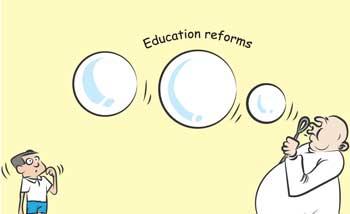Reply To:
Name - Reply Comment
 Sri Lanka’s education system has been yearning for reforms following the millennium if one had closely observed the ever-transforming education sectors in developed countries. The discourse to bring about education reforms has continued for decades. As a result, the government has drafted a National Education Policy Framework (NEPF) for a 10-year period from 2023-2033. But, academics observe that this is a loosely drafted document that hasn’t addressed several key areas of concern.
Sri Lanka’s education system has been yearning for reforms following the millennium if one had closely observed the ever-transforming education sectors in developed countries. The discourse to bring about education reforms has continued for decades. As a result, the government has drafted a National Education Policy Framework (NEPF) for a 10-year period from 2023-2033. But, academics observe that this is a loosely drafted document that hasn’t addressed several key areas of concern.
The Executive Summary states that Sri Lanka’s education system is heavy on content and examination-driven, thereby selecting a small percentage of students on to an academic path. The competition created as a result of an education system that spoon-feeds children on content has done more harm than good. As a result, children are more inclined to study theory and they don’t develop any ethics or moral values as they have limited interactions with one another. More than the students, it is the parents who run around ensuring that their children are the best; paying thumping amounts of money for tuition classes as soon as their children enter Grade 1!
Poor quality standards of teaching maintained in rural schools have led many children to dropout or omit certain subjects which are considered important, such as English and Mathematics. Discrepancies in the distribution of facilities in National and Provincial schools, differentiation of schools based on religion and language have created a further divide among families who can afford to provide a quality education for their children versus families who can barely afford to send their children to school.
The NEPF further states that ‘a transformation of education cannot be envisioned without an understanding of emerging technologies including Artificial Intelligence (AI), climate change etc.’ But prior to introducing AI to schools, one needs to reminisce the days of the pandemic when children in rural areas could barely afford a smartphone to follow online classes! Even if they did have smartphones, most children had poor reception. The situation hasn’t changed from then to now, and most schools don’t even have a computer lab in the first place. So without proper knowledge on Information Technology as a subject, whether children could grasp the complexities of AI remains a question.
Many have blamed the lack of a poor education system as being a root cause for the soaring number of cases related to child abuse, harassment and rape. For the longest time, child rights activists and lawyers have been demanding to introduce sexual education as a compulsory subject in the school curricula. But it is a known fact that teachers tend to avoid this particular section in the biology class. When a fundamental subject had taken years to be integrated into existing curricula, there certainly seems to be limited scope for change.
The NEPF identifies that the absence of a formal system to transfer from school to vocational education leads students to leave school and find employment without sufficient training. A strong education system would ultimately produce a highly skilled workforce in any country. But the prevailing education system has failed to address this need of the hour. Plans are afoot to recruit more teachers to develop estate sector schools, but it has now come to light that most teachers are political appointees.
Inclusive education is another area of concern given that many children with special needs don’t have an opportunity to learn with other children. Concepts such as shadow teaching have been introduced in many private education institutions from primary level. Teachers need to be trained to international standards of teaching while the government should also look at recruiting counselors and trained psychologists in schools. This will help children to be more open about matters that worry them; thereby giving them the space to bring up matters that they wouldn’t want to speak with their parents or friends.
The NEPF has addressed certain areas of concern from the periphery. But without a detailed outlook on matters of serious concern, this policy document would be another one that would gather dust in time to come. However, it is high time that the government now moves to bring about a holistic education system to produce skilled individuals with moral and ethical values to society, rather than programmed, inhuman, anti-social robots.